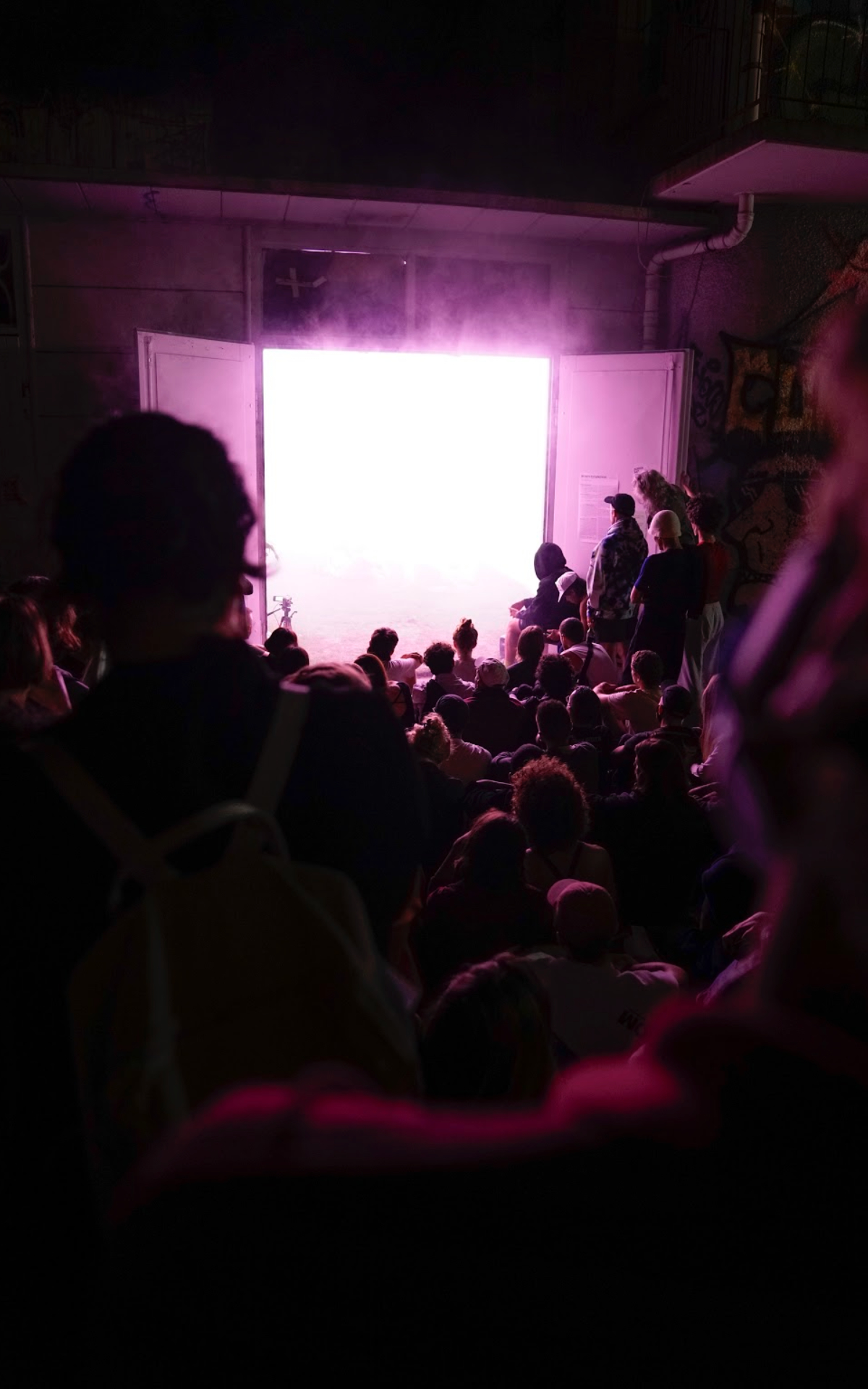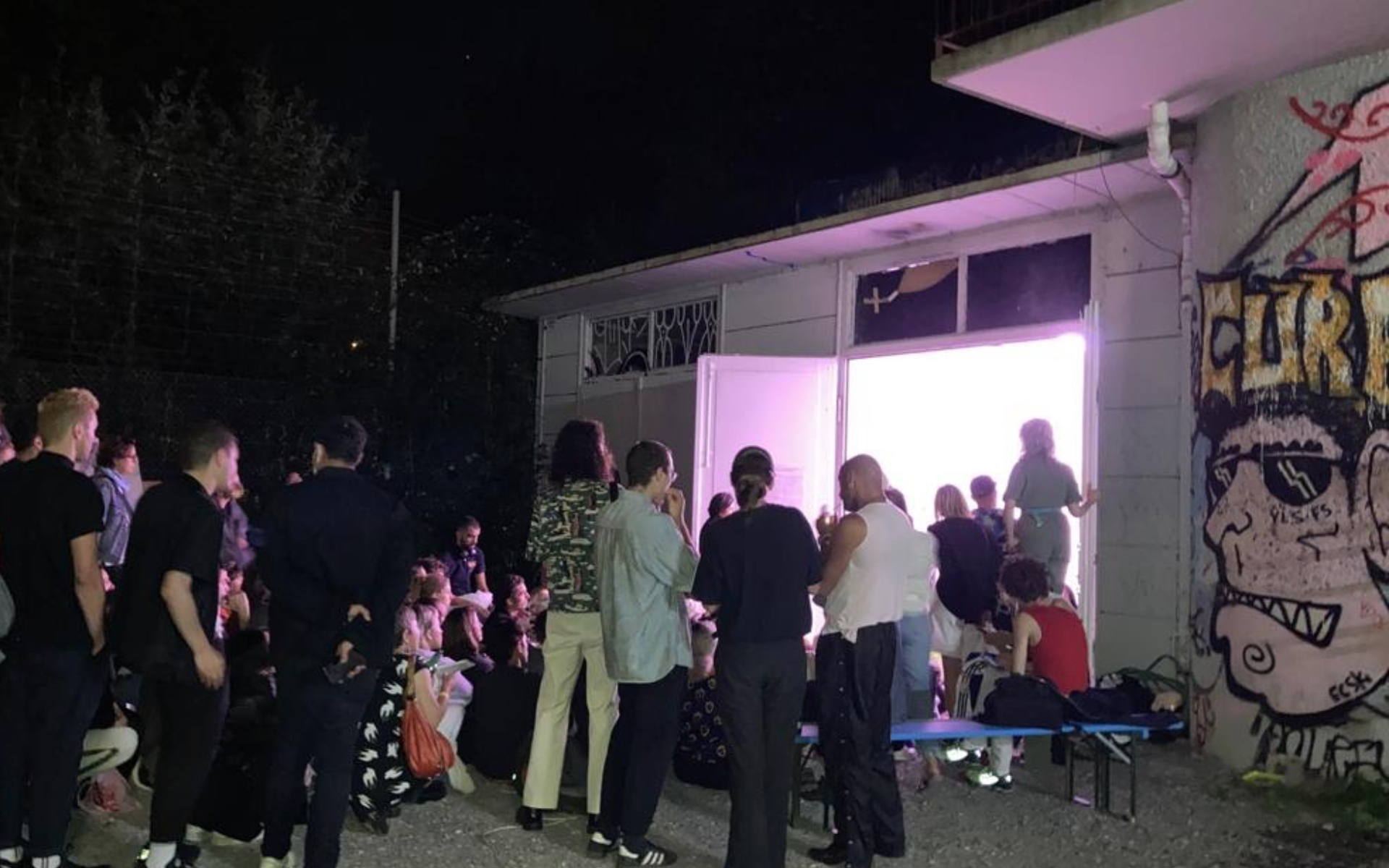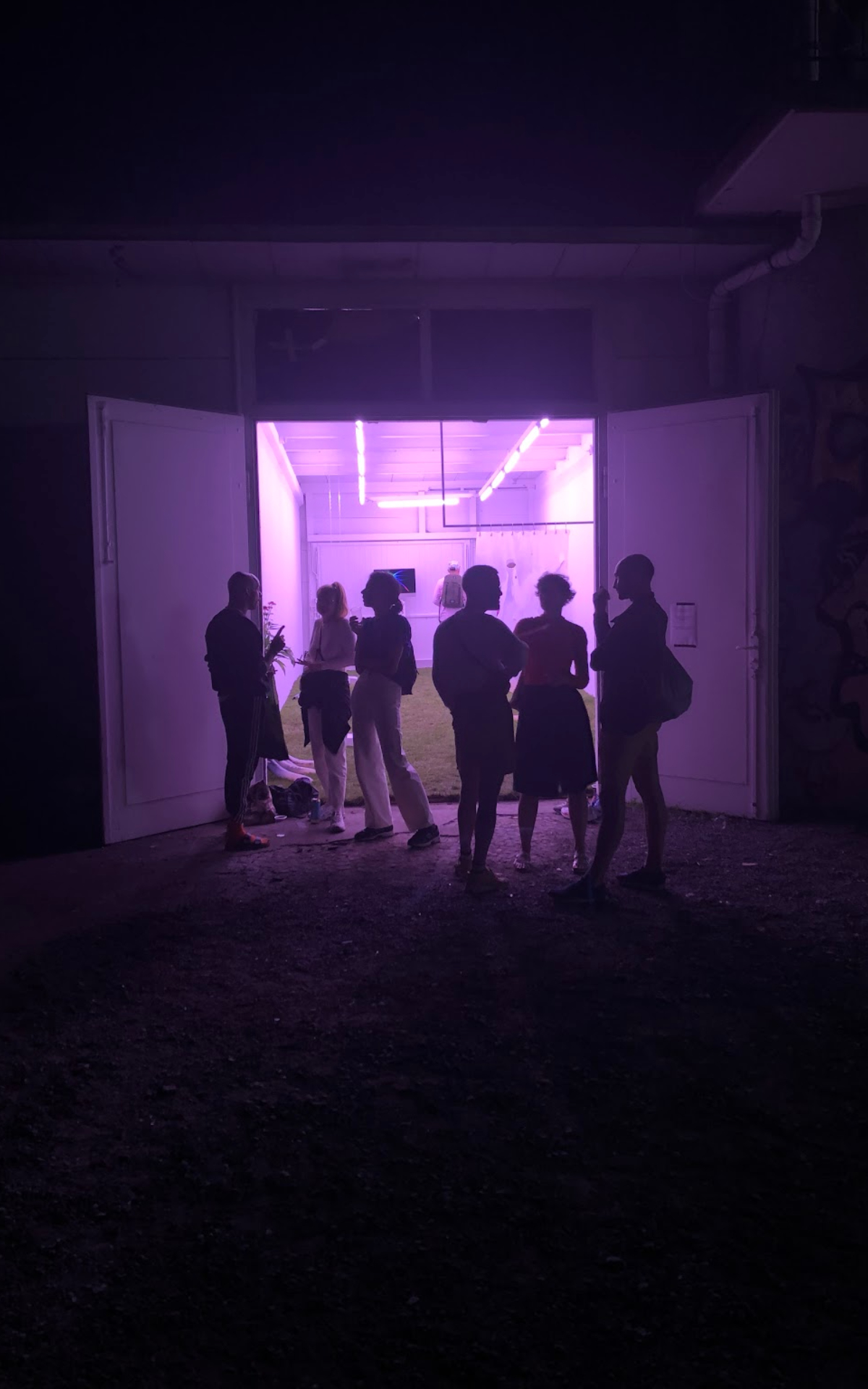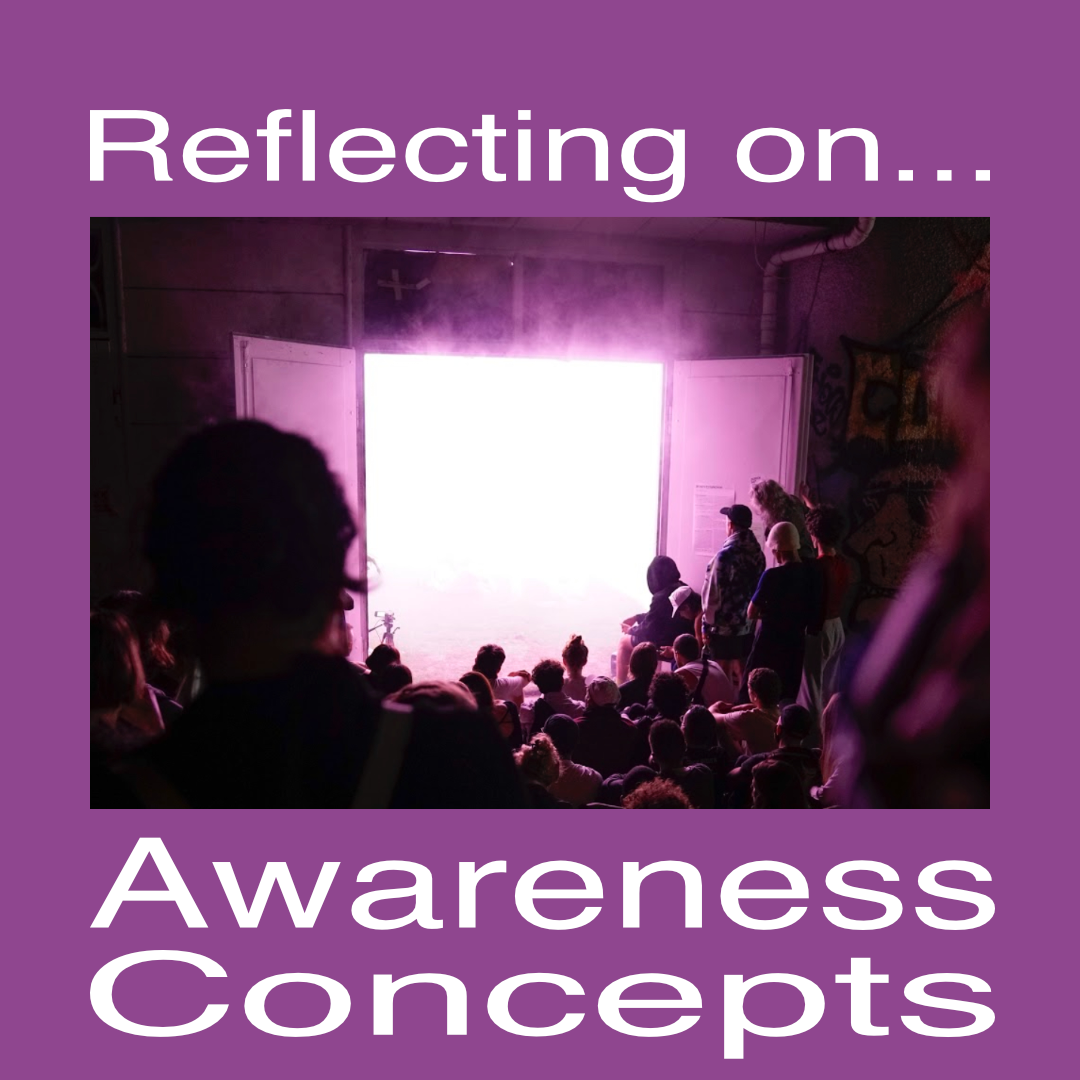


A couple of months ago, I embarked on an exciting journey with a new collective, which is actually the expansion and re-structure of an artist(in this case DJs)-run space called Mikro, and arrived here, writing before tonight's important "awareness meeting".
The Genesis of big things is always a little blurred, and Mikro follows the rule in this case. In the beginning, there were three collectives who made up Mikro, but after several vicissitudes, only one remained. In general, the labels and music have always been crucial for the identity of this independent-run space, founded in 2014, that played a role with other venues to build an electronic music scene in Zurich.
Now, several exhibition openings, parties and concerts later, the same four people decided to turn the page: expand and restructure. This requires not only flexibility but, also the readiness to face exposure and the risk that the purposes and founding principles (do artist-run spaces have a soul?) are jeopardised, transfigured and distorted. It's an act of faith from the founder of the space towards the newcomers. Especially when a well-worked-in four-friend crew grows to twenty strangers coming from entirely different backgrounds.
What's this Mikro anyway? Mikro was a space for electronic music where contemporary art shows were also organised. After years working entirely for free (artists were paid though!), the collective decided to apply for public funding to pay themselves a fair wage without distinguishing between curator, graphic designer, technician—everyone gets the same money per hour. Differently as an artist-run space, Mikro did raves open for everyone. This decision started from a critique of the contradiction that clubs and techno spaces describe themselves as open for everyone, while the door policies were severely exclusive. Dress codes, appearances, race, or gender were and still are terms for selection at club doors. With a clear reference to underground resistance, the motto was: "Music is the bouncer". The same kind of thinking got adapted to exhibition-making. While programs of so-called white-cube institutions might appear rather progressive, the same frameworks, its "door policy" excludes on many levels. A considerable part of currently exhibited art requires knowledge of a certain set of references to begin with (acquired through a privilege mostly). In Mikro, exhibitions are open 24 hours daily from their vernissage, and there's no invigilator. From the live stream recordings -camera footage of visitors of the shows- you can tell that people did actually come at four in the morning to visit and discuss the art —> I know crazy, right? During covid-lockdown, Mikro was turned into a food storage facility for low- income families, refugees, and sans-papiers so over 1,500 people were queuing for food here every week.
The search for inclusiveness is something that remains and wants to be expressed not only by picking artists solely based on their identity. Mikro decided to open up to different people running the space. On a personal note, that is a space I initially met as a visitor, had the first serious relationship with as a curator and decided to become engaged as a member.
Life ain't easy in big families. And I know it because even if I'm an only child, I do have friends who grew up in big families. The current phase is made of several hours-long meetings that can be quite draining, but normally leave satisfying feelings at the end. At times though, discussions just lead to further divergent opinions, improbable speculations and stalling questions. This aspect made me think about the structural difference between self-organised spaces and art institutions, where all the outcomes named above would be perceived as a failure, or at least as a waste of time (ed. And yet are often just as prevalent). The way I see it, this has to do with different functions and thus different values of communication. In particular, considering the amount of time spent in the last weeks deciding on communications tools due to the necessity of informing everyone about everything, compared to the "you get the information you need to know to accomplish your task at best" philosophy ruling the perfectly functioning machines I came across in my institutional experiences. Communication is far beyond the rationale behind the structure, but rather its core (maybe artist-run spaces do have a soul!) as a continuous exchange that necessarily leads to constantly questioning one's own ideas, creating lively dialogue and sometimes even stating the obvious. It's about shared responsibility. In the colourful palette of communication made of listening, observing, and repeating, there is a strong component of processuality to be considered. I would personally recommend embracing and exploring instead of seeing it as a source of frustration. And, for what it's worth, it can also be seen as a nice way to practice some resistance to the “efficiency at any cost” that we all already know enough about. In one of these meetings, we realised the a.) lack of finances to do anything, b.) need to find a collective identity, and since Mikro has originally been funded through raves, we decided to organise one.
Though, the question of identity is a rather tough one when there are so many people to be aware of. This thought brought us to the decision to draft a so-called awareness concept for our first event in a couple of weeks.
*
Awareness is a wonderful word.
Talking from my personal experience and risking showing my rough ignorance, I have the feeling that this awareness-concept frenzy is something that is particularly widespread in the Middle-European regions. Others might name it differently, others might not feel the need for it (or not realise it), others have never heard of it. A short linguistic digression could be needed:
The English dictionary defines the term "awareness" as "Knowledge or perception of a situation or fact". But the awareness meant in an awareness concept implies much more. In German, this notion is not translated into "Bewusstsein Konzept" but instead used in English terms; otherwise, it wouldn't be clear which kind of "Bewusstsein/Awareness" we are talking about. For the same reason, it makes perfect sense that in English speaking countries, people refer to this same idea using other (more specific words). Needless to say, I'm very curious to know more about that, and I'll be grateful for any information about the diffusion and characteristics in the employ of this practice around the world.


An awareness concept is something you usually come across at parties, festivals and concerts, but it's definitely needed at exhibition openings or artist talks as well.
The way to "live" a space, in fact, applies to each event. "Awareness" describes a concept that deals with disregarding physical, psychological, and personal boundaries up to violence in public spaces. In doing so, sexist, racist, queerphobic, transphobic, ableist or comparable violent behaviour is countered. These assaults are not merely considered on an individual level but embed them in the structural and social power relations that affect all our lives. People who feel affected are supported and accompanied, and this is where all the members of a collective or event organisers -or members of an awareness team- are called to "be prepared". It's not only about what constitutes right / wrong behavior, and in addition, many also feel unsure how to react if something happens.
Basically, it means to create space, and here returns the much acclaimed "safe space". But since we all know that "it's not a safe space just because you call it so" a lot of work is needed to create an awareness concept (let alone create awareness).
We invited an external person for a workshop, who already had experience in several types of collectives. This kind of transmission of knowledge from one to others is something that I consider as idiosyncratic of self-organised spaces. It's about the exchange of know-how from a person who's considered an expert simply because of her many and diverse experiences on the field gathered throughout the years, more than something (normally on a piece of paper) to show.
Here are some notes directly from my diligent minutes:
♥ There's nothing like one-fits all: every art organisation should develop a tailor-made awareness concept and team. The only shared common denominator is the ultimate goal of society, avoiding discrimination of any kind.
♥ There's so much more happening at an event than what you perceive. No reports of incidents doesn't mean no incidents.
♥ The power of definition. From whom does the definition originate to determine an act as racist, ableist, sexist or otherwise discriminatory? Every person affected by such discriminatory violence can only say about themselves. So don't play Judge Judy is basically one of the columns of the whole topic. On the other hand, the power of definition shouldn't be waved like a sceptre to punish people for their fallibility. Violence is experienced, classified and assessed differently based on the personal history, present and experience of those affected. Since all social interactions are influenced by patterns of rule, power imbalances and the dynamics caused by them, the person concerned has the power to define.
♥ It is not necessarily about establishing an objective truth of what happened, but rather about building counter-POWER.
♥ The fact that the concept of the power of definition was historically developed by black TrIQ (TransInterQueer) people in the USA clarifies why it was so important to build up a countervailing power. Here it could get tricky, though. In discussions, the question has arisen whether there are situations in which personal conflicts are politically charged, or the concept of the power of definition could be instrumentalised for personal purposes or, to exercise power with it. A common argument is that criticism of people with fewer privileges would be made so impossible because of the fear of saying "something wrong". Therefore it’s important to analyse such situations clearly and consider structural power relationships and individual behaviour - and take responsibility for both and on both levels.
♥ Both empathy and abstractedness are equally important.
♥ Is there a place of retreat for those affected if there has been an incident or someone needs a break from the hustle and bustle? If not, could you do one? No expensive yogi tea and incense are needed, but a calm space (especially if the event is with music) would help a lot.
♥ Compact version (in the form of posters, flyers, short video, sound installation, mention before at the door, website, Insta Stories, whatever works..) awareness policy should be available in several languages in visible places such as entrance, bar, toilets, cloakroom.
♥ External employees involved in the organisation should be informed as well.
♥ Finally, self-critically - it's true that people with white privileges, including white awareness people, have the feeling to have understood all forms of oppression anyway and can support people, regardless of the violence they are currently affected by. As an example, Christian-white feminists who believe they have fully understood racism because they know oppression in the form of sexism and draw a simple analogy - forms of oppression are, however, complex and cannot be transferred and compared 1: 1.
(for a complete list of awareness concept points to take into consideration.)

Although I agree on a well-spread need for awareness concepts, I'm also wary about it. Not really because of the high number of people involved that will have to agree on it (in Italy there are 395 Parliament Members), but rather for its own ethics and question of who should and may decide whether something must and can be described as discrimination/crossing borders. As a context of awareness and concerning the creation of a society and world free of domination, dealing with different levels of discrimination is right and essential in order not to reproduce them in our own contexts constantly. Yet, it continuously requires effort without reproducing the same assertive model it aims to deny. It could be a delicate challenge not to be perceived as a "higher authority" and not act in a determining, imperative, one-dimensional and unauthorised manner, but supportive and context-sensitive. Furthermore, we have to keep in mind that the axis of educational capital (= educational advantages) and class affiliation is sometimes forgotten in relation to existing levels of discrimination. It's quite fundamental to recognise that the use of non-discriminatory language is also partly related to the education of people to avoid elitarian scene codes and related behaviours. When dealing with an intersectional and multidimensional perspective, constant reflection on this is fundamental.
The peril of "weakening of terminology" is around the corner as well. In personal disputes, using terms such as "crossing boundaries", "assaults", "abuse", "trauma" or "trigger" in an inflationary way brings situations to become blurred and weakens those affected. Example: "The guy interrupted me, that's sexist". We shouldn't stay on this personal level, but instead, go into depth and see if and why these relationships exist. In this way, we can see how exclusion and discrimination affect the psychological level and have "material", concrete consequences.
We are not immune to internalised power relations, dominance, internal resistance and conflicts, but have to work every day to reveal and unlearn them.
Overall, I guess ultimately an awareness concept is also an occasion to enable discussions in different groups and finally promote (self) reflection.
Instead of using "Safe spaces" that can sound a little naive, we might start using the term "Safer Spaces" to indicate that there are only steps in the right direction and there will be no definitive solutions. Awareness work is and will remain a process. This is an interesting topic that leaves many questions open, most of them probably situated and depending on the specific context. We have to leave our comfort zone, decide for the ultimate "safe space" and venture into unknown terrain. If we assume that the inclusion and application of awareness concepts will take place in different phases, Mikro may be in a "caution phase" at the moment. We approach them, get to know them. We will slowly get used to them, understand them, and apply them. Errors can (will) also happen, and the concepts might be abused willingly and involuntarily. Long-term thinking and unlearning processes require patience.
As proof of this, still, no awareness concept has been made tonight.
I guess I'll embrace the processuality and carry on.
More info:
>>>in German though, Google Chrome has the option to translate the page.
Jacky Wang. 2012. "Against Innocence. Race, Gender, and the Politics of Safety." First published in LIES: A Journal of Materialist Feminism, Vol 1 (2012). In particular chapter "Safe Space", pp. 16 - 21.
ESSAY
Giulia Busetti - AUG 2021

The Reflecting on... series takes situations, objects, artworks, articles, texts, podcasts and anything else really as starting points for reflection on artist-led and self-organised (AL&SO) practice.
Ephemeral Care focuses on ethics, practice and strategies in artist-led and self-organised projects.